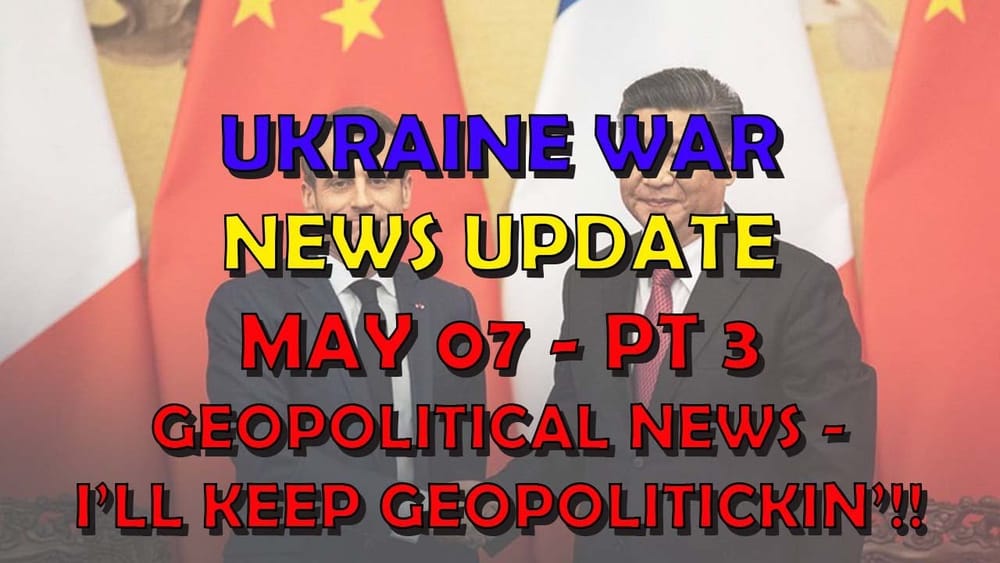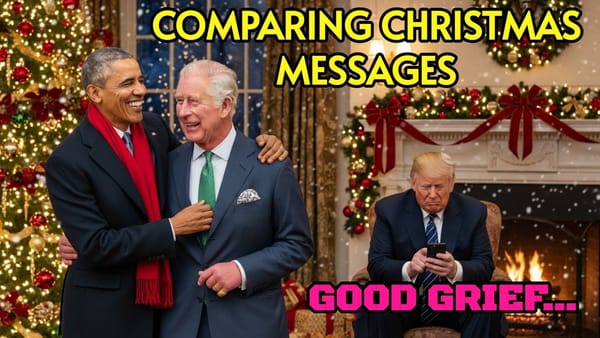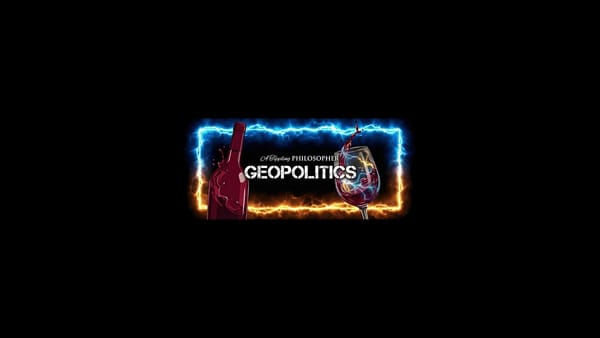Ukraine War Update NEWS: Geopolitical News
Table of Contents 📖
"And this, again, it's this idea of like, is cyber warfare warfare? You know, is this enough to go to town against China? What do we do about this? I think it's a real challenge."
Hello Team
🎦 00:00-00:15⏩
Jonathan welcomes viewers to another ATP Geopolitics video, a geopolitical update focusing on the Ukraine War, specifically geopolitical news. He notes that this is the third part of the May 7, 2024 update.
Return to top⤴️
EU to Allocate 90% of Frozen Russian Assets Revenue to Ukraine
🎦 00:15-03:52⏩
Jonathan discusses the EU's plan to dedicate 90% of the revenue generated from frozen Russian assets to Ukraine's defense. This commitment, amounting to several billion euros annually, is lauded as a significant development for sustained military support. He contrasts this with US aid, estimated at $61 billion, highlighting that only $20-25 billion constitutes direct military assistance, with the remainder allocated to replenishing US stocks, humanitarian aid, and related expenses. This EU initiative is seen as providing a dedicated and continuous stream of funding for Ukraine's defense efforts. Jonathan speculates on the potential utilization of accumulated profits from 2022 and 2023, suggesting a possible immediate fund of $6-10 billion. He underscores the provision allowing neutral EU member states to contribute humanitarian aid instead of military assistance, acknowledging its value to Ukraine.
Return to top⤴️
Italy's Defense Minister's Inconsistent Stance on the War
🎦 03:52-04:47⏩
Jonathan highlights what he perceives as contradictory messaging from Italy's Defense Minister, who, despite advocating for maximum support for Ukraine short of troop deployment, has publicly deemed economic sanctions against Russia ineffective and urged diplomatic solutions with Putin.
Return to top⤴️
Ukraine Aims for May Security Agreement with the US
🎦 04:47-05:52⏩
Jonathan discusses Ukraine's objective to finalize a security agreement with the US within May, emphasizing the significance of such an accord. Andriy Yermak, Head of the Ukrainian Presidential Office, is reported to be leading negotiations, aiming to expedite the process. Jonathan posits that these bilateral agreements, including ongoing discussions with Belgium, are designed to deter future Russian aggression and bolster Ukraine's security posture. He believes these agreements would be activated in the event of any peace negotiations or if Russia attempts further aggression.
Return to top⤴️
Putin's Fifth Term Inauguration and the Normalization of War in Russia
🎦 05:52-09:42⏩
Jonathan notes Putin's fifth term inauguration, pointedly mentioning the lack of delegates from many nations, signifying a decline in international support. He cites a Bloomberg report indicating that Russians are adapting to the ongoing war, highlighting the phenomenon of gradual desensitization, akin to the "lobster in a pot" analogy. Jonathan contends that Putin's strategy involves incrementally imposing restrictions and hardships, allowing the population to acclimate over time, thereby normalizing the war and suppressing dissent. Jonathan observes the increasing militarization of Russian society, citing the prevalence of pro-war symbols like the "Z" and the "George Stripes," reflecting a shift in cultural norms. This pervasive militaristic sentiment is seen as a deliberate strategy to consolidate support for the war effort. He observes the irony in Putin's approach: while causing a demographic challenge by prompting the exodus of skilled individuals, primarily men, Putin seemingly prioritizes internal stability over potential economic consequences.
Return to top⤴️
Germany Recalls Ambassador from Moscow over Cyberattacks
🎦 09:42-10:53⏩
Jonathan covers Germany's decision to recall its ambassador from Moscow following alleged Russian cyberattacks, including one targeting the Social Democratic Party (SDP) in 2023. This incident, considered a significant diplomatic escalation, is analyzed within the context of the complex relationship between Germany and Russia, particularly considering historical ties and sympathies for Russia within certain segments of German society, especially in the East. Jonathan suggests that continued Russian aggression, particularly cyberattacks directly impacting Germany, could erode remaining sympathies and further unify Europe against Russia.
Return to top⤴️
The Unifying Nature of a Common Enemy
🎦 10:53-12:38⏩
Jonathan delves into the psychological and political dynamics of external threats, arguing that recognizing a common enemy can act as a unifying force. He draws parallels with historical instances like the US post-9/11, the UK during the Falklands War, illustrating the "rally around the flag" effect, which often translates to increased support for leaders and national unity in times of conflict. He cautions Russia against overly aggressive tactics, particularly those that could be directly attributed to them, as this could backfire by unifying Europe against them. He acknowledges that while cyberattacks and disinformation campaigns may sow discord, their effectiveness diminishes when directly linked to Russia, potentially strengthening European resolve.
Return to top⤴️
Putin Threatens UK with Strikes: Analyzing the UK's Stance on Russia
🎦 12:38-18:49⏩
Jonathan shifts focus to Putin's recent threats against the UK, noting the historical context of the UK's generally unfavorable view of Russia, stemming from their Cold War rivalry and lack of the historical entanglements experienced by continental Europe. He argues that unlike the US, where a segment of the population seems drawn to Putin's brand of social conservatism, the UK's predominantly secular society is less susceptible to such appeals, thus explaining the UK's unwavering support for Ukraine. He examines the UK's bipartisan stance on the Russia-Ukraine conflict, attributing it to the absence of historical baggage and the clear moral dimension of the situation, solidifying the UK's position as a staunch critic of Russia's actions. He points to instances like the Litvinenko and Skripal poisonings on UK soil as clear demonstrations of Russian aggression, contributing to the already strained relationship and justifying Putin's targeting of the UK in his rhetoric.
Return to top⤴️
Russia Orders Nuclear Drills: Escalation or Empty Threat?
🎦 18:49-22:12⏩
Jonathan discusses Russia's announcement of nuclear drills, perceived by some as a significant escalation in response to perceived threats, primarily the UK's stance on the use of Western-supplied weapons within Russian territory. He contrasts this with previous instances where Russia seemingly backed down after crossing various "red lines," such as the provision of advanced weaponry to Ukraine, including HIMARS and main battle tanks. He dissects the potential implications of these drills, acknowledging varying perspectives on their seriousness. Jonathan acknowledges concerns about escalation while personally leaning towards dismissing them as a familiar tactic employed by Russia to deter further Western involvement. He analyzes Russia's reliance on nuclear rhetoric as its primary leverage on the global stage, contrasting it with the West's reluctance to engage in similar saber-rattling.
Return to top⤴️
Russia's Military Limitations and the Threat of Tactical Nukes
🎦 22:12-24:48⏩
Jonathan delves into analysis from the Institute for the Study of War (ISW) and experts like George Barros, suggesting that Russia's ability to employ tactical nuclear weapons on the battlefield might be overstated. He cites the degradation of their military equipment, particularly the specialized BMP infantry fighting vehicles designed to operate in radioactive environments. Jonathan argues that Russia's lack of adequate equipment and the vulnerability of its remaining forces to radiation exposure render the use of tactical nukes impractical. While acknowledging the inherent danger of dismissing any nuclear threat, he remains skeptical of Russia's ability to follow through on its rhetoric in this specific context.
Return to top⤴️
John Kirby's Response to Russia's Threats
🎦 24:48-25:58⏩
Jonathan highlights John Kirby's response to Russia's threats, advocating for the withdrawal of Russian troops from Ukraine as the most effective solution to prevent attacks on them, rather than resorting to nuclear intimidation. This straightforward approach is commended by Jonathan as the logical and morally sound course of action.
Return to top⤴️
EU to Sanction Russia's Alternative to SWIFT
🎦 25:58-26:05⏩
Jonathan reports on the EU's upcoming ban on the use of Russia's alternative messaging system to SWIFT, the global financial messaging network, as part of its 14th sanctions package. This move aims to further isolate Russia from the international financial system by penalizing Western entities that attempt to circumvent sanctions using Russia's alternative system.
Return to top⤴️
Hungary: Opposition Leader Gains Traction with Anti-War Stance
🎦 26:09-27:55⏩
Jonathan shifts focus to Hungary, discussing the growing popularity of Péter Márki-Zay, the leader of the opposition coalition against Viktor Orbán's Fidesz party. He details Márki-Zay's background and his recent speech in Debrecen, a Fidesz stronghold, where he condemned Russian aggression and called for peace talks. Jonathan suggests that despite Márki-Zay's call for peace potentially resonating with those seeking an end to the conflict, his messaging is strategically calibrated to appeal to a broader base and avoid being labeled as pro-appeasement or pro-Putin. Jonathan highlights the significance of Márki-Zay's emergence as a potential challenger to Orbán, signaling a possible shift in the Hungarian political landscape, particularly regarding the stance on the war in Ukraine.
Return to top⤴️
China's Position on the War: Balancing Act and Cyber Espionage
🎦 27:55-32:30⏩
Jonathan analyzes China's stance on the war in Ukraine, focusing on Macron's recent meeting with Xi Jinping. He cites Macron's cautious optimism regarding China's commitment to refrain from supplying weapons to Russia while acknowledging Xi's emphasis on diplomatic solutions and opposition to using the crisis to criticize or isolate China. Jonathan notes the potential for leverage over China, suggesting that a tougher stance on trade and economic policies might yield results in curtailing cyber espionage and potential support for Russia. He reports on a significant cyberattack, potentially attributed to Chinese hackers, targeting the UK Ministry of Defence. This breach exposed the personal and financial data of approximately 270,000 UK armed forces personnel. Jonathan discusses the challenges in formally attributing such cyberattacks, highlighting the principle of plausible deniability often employed in cyberwarfare.
Return to top⤴️
The Nature of Cyberwarfare and International Response
🎦 32:30-34:45⏩
Jonathan ponders the broader implications of cyberattacks, questioning whether they should be considered acts of war and how nations should respond to such incidents, particularly given the difficulty in definitively attributing them. He argues that the lack of clear consequences for cyber aggression could embolden state actors and undermine international security. He highlights the EU's consideration of stricter trade measures against China, possibly as leverage in addressing cyber espionage concerns. This approach reflects a growing trend of linking economic policies with cybersecurity concerns, seeking to establish a more assertive posture in protecting national interests.
Return to top⤴️
Addressing Criticism and Defending Opinions
🎦 34:45-43:50⏩
Jonathan addresses criticism directed at his geopolitical analysis, particularly from those who find his opinions intrusive or question his expertise. He defends his approach, emphasizing that simply relaying facts without offering analysis would be "vacuous" and less engaging. He argues that offering informed opinions is integral to stimulating discussion and fostering a deeper understanding of complex issues. He cites his background as a political journalist, defending his knowledge and experience while acknowledging that he doesn't claim to be an absolute expert. Jonathan contends that those criticizing his opinions often do so because their views sit on the opposite end of the political spectrum. He distinguishes between constructive criticism, like that from viewer John DeVries, and attacks from obvious trolls, often identifiable by their online behavior. He reiterates that he doesn't seek to convert viewers to his viewpoints but believes in the value of engaging with diverse perspectives, even those he disagrees with. Jonathan concludes by emphasizing the importance of open dialogue and expressing gratitude for his diverse viewership, appreciating their engagement and willingness to consider different viewpoints.
Return to top⤴️
Wrap up
🎦 43:50-43:53⏩
Jonathan expresses his appreciation for viewers who engage in discussions and hold diverse viewpoints, concluding his geopolitical analysis for the day.
Return to top⤴️



